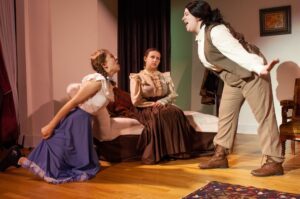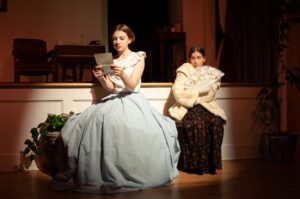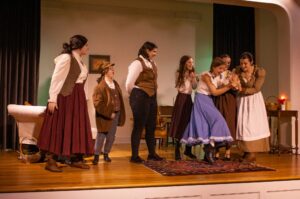This is another guest post Frida, an intern from Taiwan.
If I had to describe the state of the students at this school, I would say it’s an “I’m not going anywhere” state. Whether it is reading, skiing, playing chess, chatting, drawing, playing video games, eating, rehearsing, climbing trees, playing ninja games… no matter when, where, and with whom, “I didn’t go anywhere”.




More precisely: “I’ve been living in the moment, and my sense of wholeness has not been altered by a change in outward behavior.” By contrast, public school students who lack the experience of freedom and autonomy, like me in my adolescence, are in a state of “I don’t know where I am? What am I?”
A while ago, I watched the performance “Little Women” written and acted by school students. I was curious: Why can these young students stand on the stage naturally and express their deepest dreams and losses? This admiration comes from knowing that the original novel uses a lot of dialogue to present the temperament and conflict of the characters. If students simply recited all the lines, their performance wouldn’t be impressive. But why can they hold up such complex and delicate characters at such a young age? Why can they control the climactic plot and arouse our emotional tension smoothly and quickly? In fact, these questions are all asking: Why these students are so good at acting? Why their acting skills so natural and convincing? How are they trained?

 .
. 
12-year-old Indigo, who was on stage for the first time, said: “I was so nervous when I was acting! But, I think I fell in love with acting!” Susannah, who was 10 years old beside her, said: “I am not nervous, if I am nervous, the audience can’t understand what I’m saying.” Mae, who has been acting in school since she was 4 years old, is 15 years old this year. She said: “I like acting because I can get different ways of self-expression through different roles!”
Mae has received professional drama training and believes that there are two characteristics of the school, which profoundly affected the performance of the students: “First, our students get along with mixed ages, which makes us used to interacting and talking with people of all ages, and naturally learns to listen to various opinions and expressions, so we can easily establish relationships with different characters when acting. Second, our school encourages everyone to freely express their ideas, so when we stand on the stage and interpret the voice of the characters, we are not reciting lines, but naturally expressing the values we believe in. Listening and expressing is our daily life.”
If a play relies on actors’ understanding and interpretation of human nature, as well as the nourishment of free expression, then students of this school can get into the play naturally without hard rehearsal. What they receive ate not only drama training, but the edification and nourishment of overall life. Their acting skills grew out of the soil of free and democratic life.
